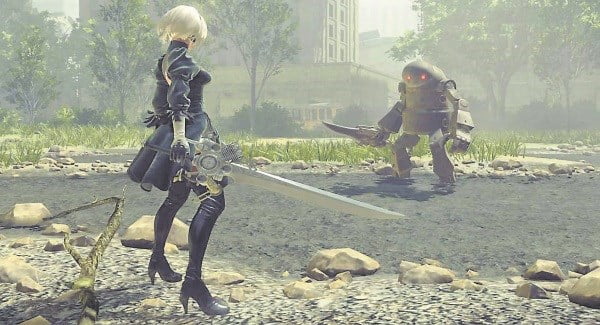
Resurrection is a fitting theme for Nier: Automata. The game’s protagonists have been reborn more often than Dolly the Sheep. They probably wear sunglasses to bed, they’ve seen the light so often.
The central characters are all androids, programmed solely to wage war. These faux humans were constructed to protect Earth against alien-controlled robots, but humanity has long since died out and the androids and robots have kept on fighting. Every time the androids die, their consciousness is transported to a space station circling Earth, where they are given new bodies and sent out to fight again.
This pulp premise lays the foundation for a superb story in Nier, a surprisingly philosophical and touching tale about identity and death and soldiers, exactly the kind of story you might expect from a quality anime or manga.
More importantly, the theme of resurrection and rebirth becomes part of the gameplay too, making this one of the rare games where story and action have clearly been designed in parallel. For example, when the game first starts, it isn’t clear how to save your progress — when you die, you need to start over from the beginning. It will probably take a few frustrating attempts before reaching the first save point, by which time you will already sympathise with the protagonists and their constant cycle of death and rebirth.
Shortly into the main quest, you realise you can visit the spot where you last died and recover data — or even revive your former self as a cadaver to fight alongside you. And, without spoiling anything, replaying the game after completion, in New Game Plus mode, is extremely rewarding. Meanwhile, the developers themselves are masters of rebirth too. Platinum Games have constantly adapted to the changing demands of the industry to remain arguably the best action-game developers in the world.
From Bayonnetta, to Metal Gear Revengeance, to Vanquish, they have yet to miss the mark with a big-budget action game. In Nier: Automata, they have created arguably their best game yet, a thrilling combination of excellent story, RPG freedom and the best combat mechanics in the industry. It’s to die for.
OUT OF THIS WORLD
Meanwhile, Guardians of the Galaxy get a rebirth of their own in the latest franchise to receive the Telltale touch. Telltale are the same company that gave The Walking Dead, Batman, Minecraft and Borderlands ‘adventure game’ treatment, which basically means Telltale created interactive stories set in those universes.
Universe is an appropriate word in this case, as Telltale’s Guardians of the Galaxy looks to blow the lid off Marvel’s version of the series. While the same characters are adopted from Marvel’s film adaptation, the story here is completely separate, going so far as to have the heroes face off with Thanos in the early scenes and, by all accounts, put a significant twist on the cinematic version of the team.
With Guardians 2 hitting screens this week, it’s interesting to see Telltale’s addition to the universe take on a life of its own.
ON THE ROAD AGAIN
Finally, one more rebirth. Full Throttle, the seminal adventure game from the 1990s, has been re-released on the PS4. Admittedly, this particular kind of rebirth happens all the time these days — an old game is touched up and sent to the market for a cash-in. Full Throttle deserves its second chance, though: not many games have told a biker gang story, never mind one that involves saving motorbikes from a future dominated by hover cars.
Like all Tim Schafer stories, Full Throttle is quirky and sharply written, which is probably the best reason to play it these days. The puzzles and ‘action’ sequences aren’t quite as endearing, but that could be said of many old adventure games – in some cases it’s half the charm. Full Throttle isn’t quite up to speed with modern games, but it’s worth the ride all the same.
[source:-irishtimes










